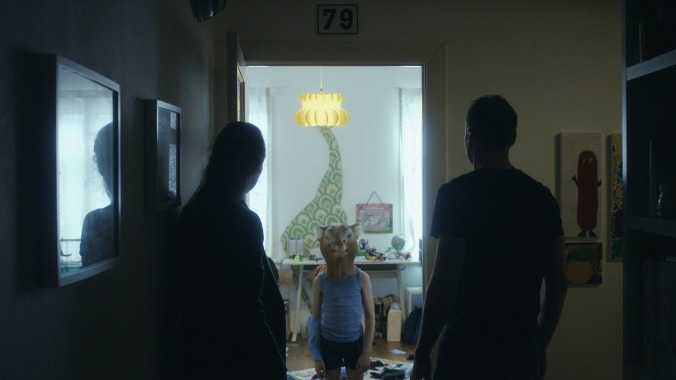Attending a film festival can feel like an extended game of Spot The Influence. That’s perhaps especially true at a fest like Sundance, which highlights the work of a lot of up-and-coming filmmakers still finding their own voice, a process that often involves the time-honored tradition of shamelessly swiping from your heroes. No slight intended there—imitation is an important step in artistic development. Give it a few years and the mimic can become the mimicked: One day you’re doing a soulful junior-varsity tribute to Terrence Malick, the next you’re inspiring new dabblers in Deep South romanticism.
If you’ve spent any time on the festival circuit lately, chances are good you’ve encountered your share of Michael Haneke wannabes. Which makes sense: Haneke—the sternly exacting Austrian director of The White Ribbon, Amour, and several other feel-bad milestones—remains a magnet of both acclaim and controversy. He makes the kind of chilly button-pushers that invariably get attention, and what could be more attractive to a young filmmaker trying to make a name for themselves? Haneke is so influential on a generation of directors that he’s effectively sprouted successive branches of influence: Where once they caught debatably appropriate comparisons to his uncompromising style, the likes of Yorgos Lanthimos and Ruben Östlund are now their own brands, inspiring their own disciples to turn a camera into an unblinking eye, pitilessly trained on the failures and foibles of bourgeois society.
I’ve already seen Lanthimos’ name lobbed around a few times in relation to John And The Hole, one of two Sundance titles this year that feels indebted to that particular school of controlled audience antagonism. But though the film’s pitch-black sense of humor and framing occasionally, vaguely recall the twisted mind behind Dogtooth, its sensibilities can be traced back just as easily to Haneke’s original-flavor provocation. In the film’s claustrophobic opening shot, 13-year-old John (Charlie Shotwell), steps into a tightly cropped close-up, slack-jawed, to address an unseen teacher, and then disappears into a classroom rendered fuzzy through shallow focus. The psychology, we’re warned, will be as cloudy as the indistinct blur that consumes the boy.
You’ve seen these techniques before. Yet John And The Hole, for all the familiarity of its spooky remove, is no empty knockoff. Director Pascual Sisto, working from a script by Birdman co-writer Nicolás Giacobone, has made a fascinating enigma of a debut that’s more Hanekian in ambiguity than severity. This is a film best seen cold, so I’ll tiptoe around an inciting incident both the Sundance description and IMDB page prematurely disclose. Suffice to say, the eponymous suburban adolescent finds an unusual way to engineer his own Home Alone, putting some distance between himself and his father (Michael C. Hall), mother (Jennifer Ehle), and older sister (Taissa Farmiga). This exercise in arranged quasi-independence provokes both suspense and a wellspring of bone-dry humor, borne out of the, well, gaping pit separating John’s inscrutable actions and the banal teenage time wasting they facilitate.
Also, maybe they’re not that inscrutable. John And The Hole is an eerie allegory that neither relentlessly explains itself nor makes its intentions totally mysterious. John may be a question mark to his family, but the film itself has a clear idea about what he’s bizarrely fumbling to grasp: that indistinct barrier that separates childhood and grown-up life. So many of us enter a nebulous space between the two—the bubble of, say, college, a twilight zone of liberation without responsibility. By the time Sisto and Giacobone introduce a meta-textual element, John And The Hole has revealed itself to be a film about the impossibility of that transition, whether it’s gradual or harshly sudden. Are we all just kids playing at adulthood?
Haneke doesn’t loom as heavily over the American art-house as he does over the European one, which is why you’re less likely to find yourself caught in the accusatory crosshairs of a Funny Games ripoff at Sundance than at Cannes. (John And The Hole—like Beginning, another recent first feature in the key of the famously punishing director—was in fact scheduled to premiere in the Palais last summer, before the plug was pulled on the French fest.) Here in virtual Park City, the other film that’s provoked some Haneke references is of German origins. Human Factors doesn’t so much ape his style as wade into the murky waters of his interests. It’s a study of an affluent family—similar in social station and configuration to John’s—that begins gradually unraveling after burglars break into their seaside vacation home, in an initial passage that at least superficially recalls the opening scene of Haneke’s Time Of The Wolf, minus the apocalyptic backdrop and burst of destructive violence.
Writer-director Ronny Trocker adopts a nonlinear structure, circling the same events—including the home invasion, which turns out to be less clear-cut than it first appears—from the separate POVs of the father (Mark Waschke), the mother (Sabine Timoteo), their teenage daughter (Jule Hermann) and their young son (Wanja Valentin Kube). The idea, perhaps, is to suggest how we’re all incapable of understanding each other’s perspectives, even when occupying the same home and sharing a life. In practice, though, this scrambled timeline ends up feeling like a blatant attempt to complicate an otherwise unremarkable story of creeping discontent; you’re left waiting for the big picture to come together, but it never quite does… which, of course, could be part of the point. Human Factors keeps threatening to tilt in a genuinely provocative direction—is it really about anti-immigrant sentiments in Europe? Is it an Östlund-style probing of male cowardice?—only to drop the thread. By the time the anti-climax arrives, you may be left wishing for the cruel shock to the system a real student of cinema’s Austrian headmaster would provide.


 Keep scrolling for more great stories from The A.V. Club.
Keep scrolling for more great stories from The A.V. Club.